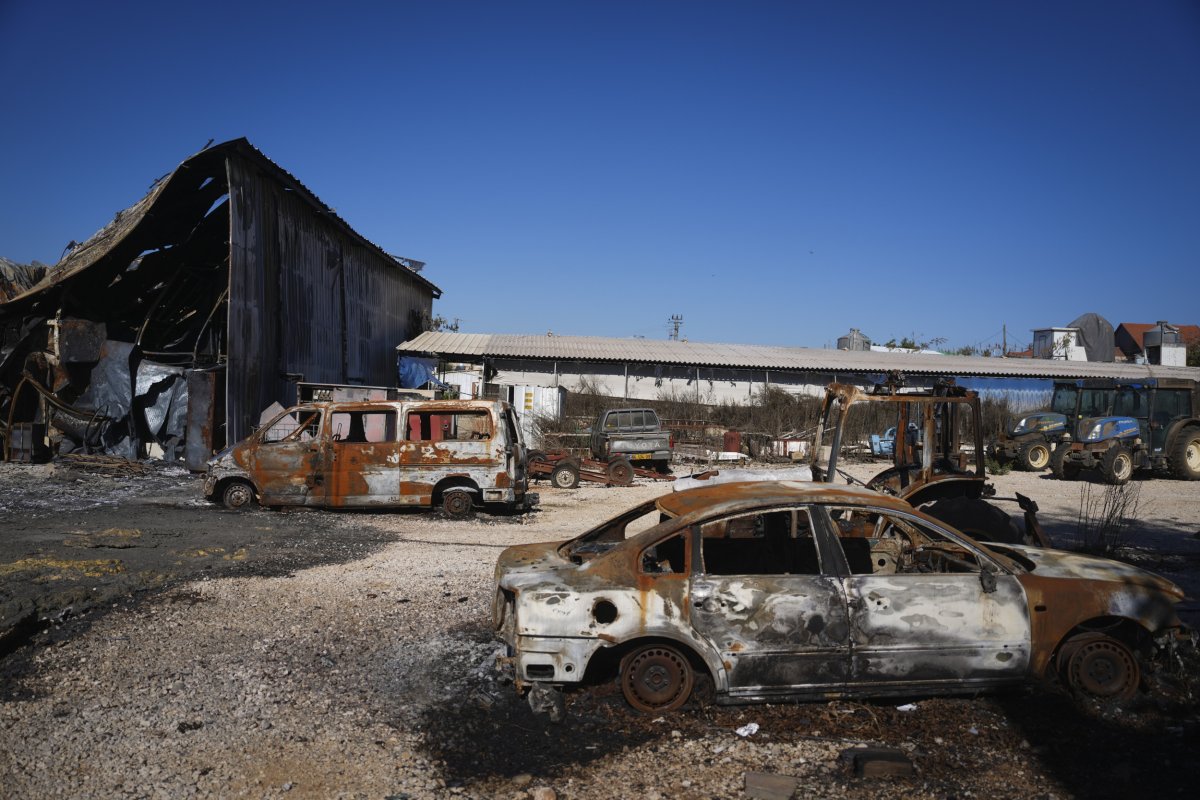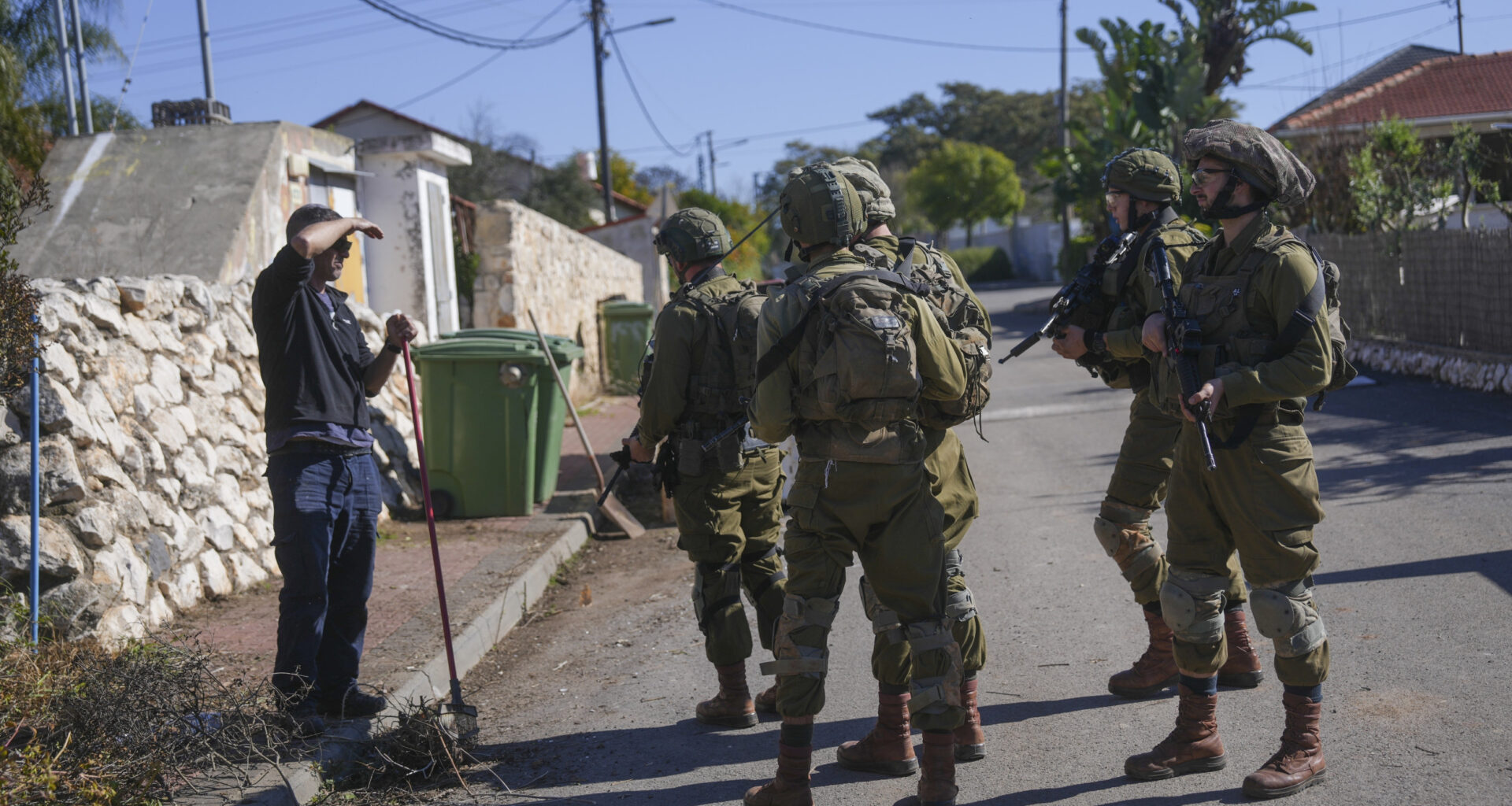The Israeli military says Hezbollah fired into a disputed border zone on Monday, the group’s first reported attack since a ceasefire began.
The Israeli military reported that two projectiles were launched toward Mount Dov, a contested area in the Shebaa Farms region where the borders of Lebanon, Syria, and Israel converge. According to Israeli authorities, the projectiles landed in open areas, causing no injuries or damage.
Israeli military correspondent Yoav Zeyton said from his X account “For the first time since the beginning of the ceasefire in the north: Hezbollah fired at Israel, two missiles, apparently from rocket launchers in the direction of Mount Dov. They fell in open areas. No casualties.”

Rafi Shitrit speaks with soldiers patrolling the area as he cleans in front of his house during a visit for the day in the agricultural settlement of Avivim, next to the Lebanese border in upper…
Rafi Shitrit speaks with soldiers patrolling the area as he cleans in front of his house during a visit for the day in the agricultural settlement of Avivim, next to the Lebanese border in upper Galilee, Israel, Monday Dec. 2, 2024. The Israeli military says Hezbollah fired into a disputed border zone on Monday, the group’s first reported attack since a ceasefire began.
More
Ohad Zwigenberg/AP
Why Did Hezbollah Break the Ceasefire?
Hezbollah said in a statement that it fired on an Israeli military position in the area as a “defensive and warning response” after what it called “repeated violations” of the ceasefire deal by Israel. It said complaints to mediators tasked with monitoring the ceasefire “were futile in stopping these violations.”
This is not the first time the region has seen action since a ceasefire was agreed between Iran-backed Hezbollah and Israel.
On Thursday Israeli warplanes targeted southern Lebanon in the first airstrike since a U.S.- and French-brokered ceasefire began on Wednesday.

Burned-out cars and buildings from Hezbollah rockets are seen in the agricultural settlement of Avivim, near the Lebanese border in the Upper Galilee, Israel, on Monday Dec. 2, 2024. Despite the ceasefire with Hezbollah, Israelis…
Burned-out cars and buildings from Hezbollah rockets are seen in the agricultural settlement of Avivim, near the Lebanese border in the Upper Galilee, Israel, on Monday Dec. 2, 2024. Despite the ceasefire with Hezbollah, Israelis remain wary of returning to the north. The Israeli military says Hezbollah fired into a disputed border zone on Monday, the group’s first reported attack since a ceasefire began.
More
Ohad Zwigenberg/AP
The missile hit a Hezbollah rocket storage facility.
Hours earlier, Israel fired on individuals attempting to reenter restricted areas in the town of Markaba, citing ceasefire violations, while Lebanon reported two injuries from the incident.
Was the Ceasefire Already Broken?
On Monday, Lebanon’s Parliament speaker accused Israel of committing 54 breaches of the ceasefire that ended the war between Hezbollah and Israel, demanding urgent intervention to halt what he called “flagrant violations.”
In response Israeli Foreign Minister Gideon Saar says he spoke to French Foreign Minister Jean-Noël Barrot and emphasized that Israel is not violating ceasefire but enforcing them in response to Hezbollah violations.
He said via a post on his X account “I spoke with @jnbarrot France Foreign Minister about the ceasefire understandings in Lebanon. I emphasized that Israel is not violating the ceasefire understandings but rather enforcing them in response to Hezbollah’s violations.”
What Are the Terms of the Israel-Hezbollah Ceasefire?
Both Israel and Hezbollah agreed to the current ceasefire, which required a 60-day period of no violence. The agreement aimed to bring an end to 14 months of hostilities, that began in October 2023.
Key requirements include Hezbollah withdrawing its fighters north of the Litani River and Israel gradually pulling back its forces from southern Lebanon. A multinational committee, led by the U.S., will oversee compliance, with Lebanese troops stationed to assure that the terms are upheld.
The recent conflict resulted in heavy losses on both sides, including the death of Hezbollah leader Hassan Nasrallah and significant damage to the group’s military infrastructure. Israel also suffered casualties, with widespread displacement of civilians in its northern regions.
Israeli Prime Minister Benjamin Netanyahu emphasized that the ceasefire provides an opportunity to focus on other regional threats, particularly those posed by Iran. He affirmed that Israel remains alert to any potential violations of the truce.
This article includes reporting from The Associated Press
